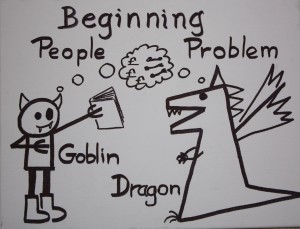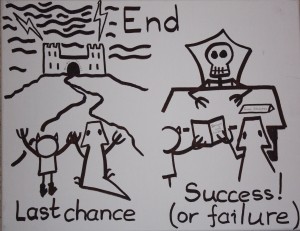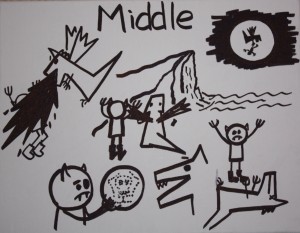Let me Crush Your Dreams For You (7/3/2013)
“If you can’t find any time to write, you don’t want to be a writer.”
Someone said that on Twitter this morning and it kicked off a little bit of a shit-storm among the dragons here. In fact, it kicked up enough of a shit-storm that I couldn’t find any time to write today, even when I should, because I was too busy debating the rights and wrongs of a statement like this. So now I’m late on a deadline and pissed off.
So anyway, on a superficial level it’s obviously bullshit. I can’t find any time to learn to play the guitar but I still want to be a rock-star. I can’t find any time to get onto the ice rink but I still want to be an Olympic ice-hockey player. I can’t find the time to get out into the garden and have at it with a spade and shears but I still want a garden that’s slightly more penetrable than a mangrove swamp. It’s perfectly possible to want something and not invest a single second of your life in achieving it. I’ll hazard a guess that almost everyone wants something that they don’t even try to get (author of the above statement included). It’s not necessarily a bad thing and it’s not even delusional provided there’s no expectation of actually getting it. [And can we pass quickly by any pedantry over the use of any in the above – if you can't find any time in your entire life to spend a second of it typing a word on a page then you're not a writer? Well duh. Can we just agree that that interpretation is so patently both obvious and useless as a statement that it's not worth the silicon atoms it takes to record for posterity? Please can we? Because arguing over that would make me want to scratch out my own tongue].
I suppose it’s clear enough that a superficial interpretation isn’t what was intended. It’s an old sentiment expressed in many subtly different ways (“writers write” being most succinct). I guess (note guessing) the intended meaning is something along the lines of “Hey, if you can’t find the time to sit down and write reasonably often – even if not for very long – and reasonably regularly, you don’t really want to be a writer enough to. . .” Enough to what I’m not sure. Deserve it? Make it? Finish a novel that no one will ever see? What? What does “a writer” actually mean? Different things to different people.
There’s a truth in the statement nevertheless, for all I’m about to rip it apart. I consider myself to be a writer by pretty much any reasonable definition. It’s my full-time job. I depend on it to pay all the bills for my family. We have no other income source. I have several novels being published each year. I take on ghost-writing work when that doesn’t pay the bills. At the moment I work 40+ hours a week as a writer. I don’t have writer’s block because it’s a luxury I can’t afford. I have to be able to sit down and write whenever and whenever. I write on trains, tubes, in coffee-shops, sitting next to my kids while they watch TV. There are a lot of things I don’t do because it’s more important to write and often there are times when I’d rather do those other things, but I can’t afford to allow myself the hours they ask for [1]. I have deadlines, lots of them. People expect me to meet them. There are consequences if I don’t, largely to do with not getting paid. Stories have to be written in a certain time whether they want to be written or not. Sometimes they come easy, sometimes they come kicking and screaming but they have to come, whatever mood I’m in, whether I or anyone around me is sick or well. Through births, deaths, divorces, marriages, house-moves, you name it, they have to come. So if your dream is to be a full-time professional writer, and you struggle to find a way to sit in front of a keyboard and write, maybe that’s not the career for you. I guess that’s a part of the underlying meaning of that statement (note still “I guess”).
But.
It wasn’t always like that. I’ve been writing on and off for twenty-five years. In that time there were fallow times, years long, were I didn’t work on my stories at all. Was I a writer then? Not sure. Did I want to be? Yes. Should I have given up? Apparently not. And anyway, is that the only way it has to be? Of course not; and who’s to say what happens after you get your first story published. If confidence is an issue, maybe being published blows that issue away and you suddenly can’t stop. Maybe the opposite happens. Maybe you clam up. Who knows? More to the point, who am I or anyone else who doesn’t know you to tell you how its going to be?
“If you can’t find any time to write, you don’t want to be a writer.”
Writers write. As a statement that’s hard to argue against. Anyone who does want to be a writer, yes, obviously you do have to actually write to actually become one. Trying to find the time might be hard but doesn’t happen by itself. It’s good advice, I think, to try and make time almost every day, even if it’s only half an hour, to write if you want that dream to come true, but if you don’t, I’d still say you should slap me for telling you what you should or shouldn’t want. You have a right to want to be anything. I might not take you very seriously, but they’re your dreams, not mine and who am I or anyone else to come along and tell you they’re not valid. For some people maybe time really is a crushing issue. For a lot of aspiring writers, I’d suggest perhaps confidence is more the problem than time. Well maybe now it is. Maybe things will be different in six months or maybe not. Maybe never. A dream is still a dream and we’re all poorer without them. I can think of several people who wanted to be rock stars long ago. Now they live ordinary lives and play in little bands that do pubs and weddings for pocket change and that’s still for them a wonderful thing. I will never be an Olympic Ice-hockey player. I might, in a couple of years, play in a small team of incompetent amateurs and have a huge amount of fun. Many aspiring authors will never publish best-sellers but that doesn’t mean they shouldn’t try. It doesn’t mean that a not-yet-expressed idea should be killed dead here and now. Maybe that novel never happens, but maybe out of the dream of it something unexpected grows instead.
If you want to be a writer, try and find a little time most days to write. Or make some notes or something to inch forward. At least do something about it. Good advice? Yes.
“If you can’t find any time to write, you don’t want to be a writer.” An insidious dream-killing cage of a statement. An authoritarian devourer of possibilities. Probably not meant as it comes across. Definitely ill-conceived. Don’t piss on my dreams, people and I won’t piss on yours.
[1] If that makes it sound like, gee, any other salary-slave job then yes, there are a lot of similarities. Do I wish I was doing something else? Hell no.


